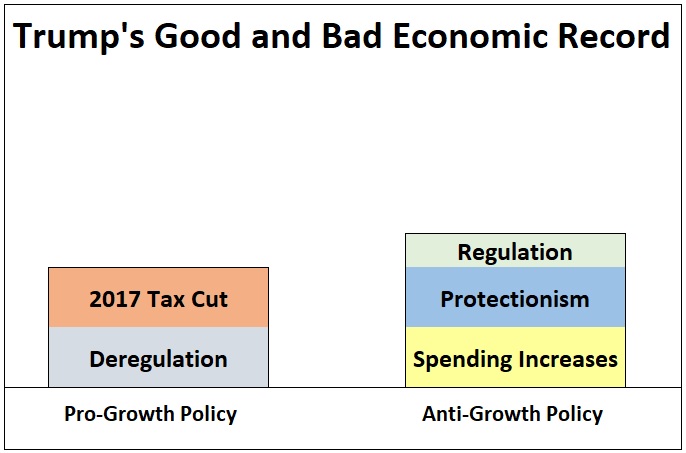Since both political parties have sent good and bad people to the White House, I don’t think it makes much sense to compare all Democratic presidents vs all Republican presidents.
But we can learn a lot by looking at the track record of specific presidents. I’ve done that with several past chief executives (Wilson, Hoover, FDR, Nixon, Reagan, Bush I, Clinton, Bush II, and Obama), and today we’re going to assess Trump’s performance.
The bottom line, as you can see from the chart, is that he did really well in some areas and really poorly in other areas, so his overall record was flat. Or perhaps slightly negative.
The bottom line is that Trump was good on taxes and bad on spending and trade.
And there were some very positive moves on regulation, but they were partly offset by areas where Trump increased intervention (coal subsidies, property rights, Fannie/Freddie, and international tax rules, for instance).
By the way, I’d like to give Trump a negative grade for his failure to address entitlements, but, in the interest of fairness, I only include actual policy changes.
Having given my big-picture assessment, here are some columns and articles that offer interesting insights.
We’ll start with some pro-Trump analysis. Professor Casey Mulligan opined in the Wall Street Journal that he restored growth (until the coronavirus, of course).
The Obama administration promulgated hundreds of new federal regulations that protected certain special interests from market competition. The beneficiaries included large banks, trial lawyers, big tech, major health-insurance companies, labor unions and foreign drug manufacturers. President Trump promised to undo all that, and in many cases succeeded, sometimes with the help of a Republican Congress.
…Mr. Trump also helped remove government obstacles to innovation and competition in health care. Democrats will tell you that the first calendar-year drop in retail prescription drug prices in 46 years was mere coincidence, not the result of deregulation. …The Fed and the Obama economic team overpredicted growth almost every year from 2010-16. When growth failed to meet their rosy predictions, Mr. Obama’s advisers blamed the poor economic performance on America itself. …No one in Washington predicted that small business optimism would skyrocket to record levels when Mr. Trump was elected, that real wages would grow again (especially for blue-collar workers), that business formation would hit 20th-century highs, or that poverty and unemployment rates would quickly fall to record lows for Hispanics and African-Americans. …Although Mr. Trump’s economic policy was imperfect, it was preferable by a long shot to Mr. Obama’s, which punished work, hiring and success rather than rewarding them.
And here’s a chart that definitely makes Trump look good compared to Obama.
Those numbers will look much worse once 2020 numbers are included, but I won’t blame Trump for coronavirus-caused economic havoc (though I also don’t give him full credit for the good data in 2019).
Now let’s look at some less-than-flattering analysis.
Jeffrey Tucker of the American Institute for Economic Research lists some of Trump’s statist policies.
From 2015, even from his first public speeches following his presidential run, it was clear that Donald Trump was not a conservative in the Reagan tradition… This is not an American ideal. It’s not about freedom, rights, the rule of law, much less the limits on government.
…Trump’s first year began with a more traditional Republican agenda of tax cuts, deregulation, and non-progressive court appointments. …That all changed on January 22, 2018. …This was the beginning of the trade war that would expand to Europe, Canada, Mexico, most of Asia, and ultimately the entire world. …What he ended up seeking was nothing short of trade autarky. …In addition to this calamity, US government spending soared 47% while the money supply registered record increases as measured by M1. The effects of this debt and money printing will be felt through next year.
Rick Newman wrote for Yahoo that Trump’s fiscal performance makes him an honorary Democrat.
Trump’s last-second objection to the $900 billion coronavirus relief bill Congress approved after eight months of negotiation is an unexpected Christmas gift for Democrats. Trump says the $600 direct payment to most Americans contained in the bill is too small.
He wants $2,000. Trump could have insisted on this while Congress was drafting the bill… Democrats are gleeful. They’d happily accept a supersized stimulus payment, and even better, they now get to watch Republicans battle each other as they try to figure out what to do about Trump. Some Congressional Republicans think $2,000 is too generous, and there’s no chance of that getting into the bill unless other provisions come out.
Newman was focusing on Trump’s spending proclivities during the pandemic, but the assertion that “maybe Trump’s a Democrat”  applies to his fiscal record during his first three years as well.
applies to his fiscal record during his first three years as well.
P.S. I didn’t rank Trump on monetary policy for the same reason I didn’t rank Obama on that issue. Simply stated, I think both of them pursued a misguided Keynesian approach of easy money and artificially low interest rates, but we don’t have firm evidence (yet) of negative consequences.
P.P.S. I also didn’t give Trump a grade, positive or negative, regarding coronavirus. The federal government failed, but those failures largely were independent of the White House.
P.P.P.S. I generally approved of Trump’s judicial appointments, but don’t includes judges in my assessments of economic policy (though I may have to change my mind if they restore the Constitution’s protections of economic liberty and limits on the power of Washington).

